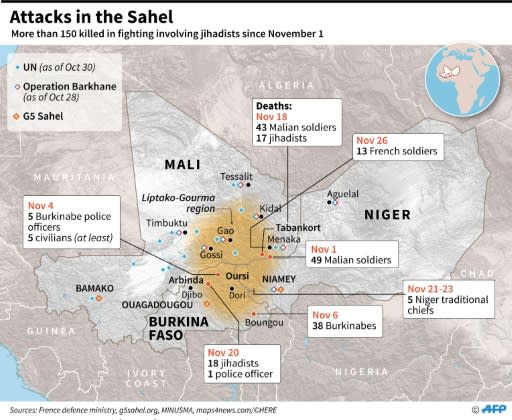Black boxes from crashed helicopters found in Mali
The black boxes from two French military helicopters that collided in Mali killing 13 soldiers have been found, a French military spokesman said Wednesday. The crash occurred late Monday during an operation against jihadists in the Liptako region, near the borders with Burkina Faso and Niger. It was the heaviest single loss for the French military in nearly four decades. "The two black boxes from the helicopters have been recovered, they will be handed over to the relevant authorities to be analysed," the spokesman, Colonel Frederic Barbry, told BFMTV. Three helicopters and a squadron of Mirage jets had arrived on Monday to support ground troops pursuing Islamist extremists. Shortly after troops engaged the insurgents, who fled on motorbikes and in a pickup truck, a Tiger attack helicopter collided with a Cougar military transport helicopter. All 13 onboard the two aircraft were killed. The soldiers' bodies will be repatriated to France where President Emmanuel Macron will lead commemorations at Invalides military hospital and museum in Paris on Monday. Barbry said no theory as to the cause of the crash was being ruled out. The conditions for flying at the time of the crash were "extremely difficult" because it was a dark night with no moonlight, the spokesman said. "The pilots work with night-vision binoculars that intensify the residual light when there is no moon, no sources of artificial light like in cities, as is the case in this region." The accident brought to 41 the number of French troops killed in the Sahel region since Paris intervened against jihadists in northern Mali in 2013. Since then, armed groups affiliated with the Islamic State group, Al-Qaeda and others have advanced into southern Mali as well as into neighbouring Burkina Faso and Niger. - No 'definitive' victory possible - The chief of staff of the French armed forces, General Francois Lecointre, warned Wednesday against expecting total victory over insurgents roaming an area the size of Western Europe. "We will never achieve a definitive victory," he told France Inter radio, while insisting that France's intervention was "useful, good and necessary". "We are producing results but we must be patient and persevere," he said, adding that a lasting solution to the unrest in the region required "military action but also action on the development front." France has 4,500 troops deployed under Operation Barkhane to help local forces hunt jihadists in Burkina Faso, Chad, Mali, Mauritania and Niger. It had been hoping that a joint counter-terrorism force set up by the five African countries would gradually take over the operations. But the G5 Sahel force has been hamstrung by a lack of manpower, funds, training and weaponry. The UN peacekeeping mission in Mali MINUSMA and regional armies, meanwhile, have also suffered heavy losses in the unrest. In some of the deadliest incidents, 43 Malian soldiers were killed in an attack in the east of the country in mid-November whereas Burkina Faso lost 24 troops in an assault on a base near the Malian border in August. Despite the challenges and the growing hostility towards French troops in Mali and Burkina Faso, both former colonies, President Emmanuel Macron's government is adamant it has no plans to scale back operations. France has presented the battle against the jihadists operating on Europe's doorstep as a battle for the security both of Africa and Europe. Former president Francois Hollande, who took the decision to intervene in Mali in 2013, on Wednesday said he stood by his decision. "If there had not been the operation which I launched on January 11, 2013, all of Mali would have been occupied by Islamist terrorists, and not just Mali. All of West Africa would have be destabilised," he said. A soldier of the French Army patrols a rural area during the Barkhane operation in northern Burkina Faso on November 9, 2019. Map of Mali, Niger and Burkina Faso, locating deaths in fighting involving jihadists since November 1



